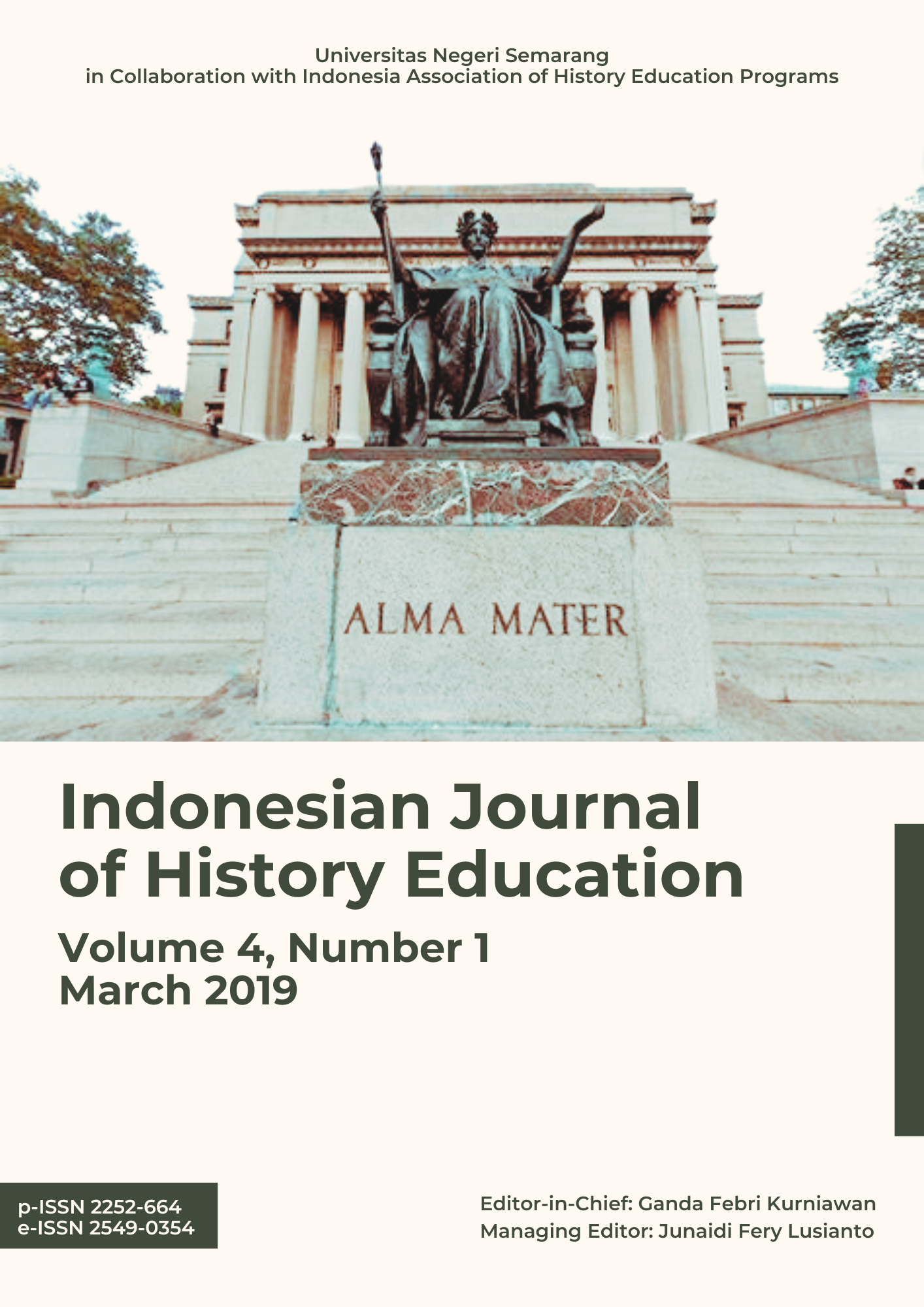Perception Student Regarding Historical Material Controversy in Shaping Reasoning Critical Students at SMA Negeri 1 Pekalongan
Abstract
The implementation of learning controversial history is crucial for enhancing student understanding and developing their critical reasoning skills. This study aims to identify how teachers handle controversial material, explore teachers' historical learning models, and describe students' perceptions of controversial historical content in shaping their critical reasoning abilities. Using a descriptive qualitative method, the research was conducted at SMA Negeri 1 Pekalongan, employing in-depth interviews, observation, and document review as data collection techniques. The study results reveal that students hold a positive and optimistic view towards teaching history when it involves controversial material. They believe that such an approach makes the subject more engaging and significantly contributes to developing their critical thinking skills. Teachers at SMA Negeri 1 Pekalongan utilize various historical learning models to present controversial topics effectively, fostering a classroom environment where students are encouraged to question, analyze, and form reasoned conclusions about historical events. This method improves their understanding of history and equips them with essential skills for evaluating different perspectives and arguments, ultimately promoting a more nuanced and critical approach to learning.
References
Ahmad, T. A. (2007). “Yang Kontemporer Yang Kontroversial”. Dalam Majalah Sapiens Edisi Khusus bulan September-Oktober tahun 2007. 2–8.
Ahmad, T. A. (2009). Kategorisasi Sejarah Kontroversial. Dalam website http://mas-tsabit.blogspot.com/2009/kategorisasisejarah-kontroverisial.html (diakses pada 25 Januari 2016).
Ahmad, T. A. (2010). Implementasi Critical Pedagogy dalam Pembelajaran Sejarah Kontroversial di SMA Negeri Kota Semarang’. Tesis Surakarta: UNS.
Ahmad, T. A. (2013). Pendidikan Sejarah, Suatu Keharusan; Reformasi Pendidikan Sejarah. Yogyakarta: Program Studi Pendidikan Sejarah, Fakultas Ilmu Sosial, Universitas Negeri Yogyakarta.
Arta, K. S. (2012). Kurikulum dan kontroversi buku teks sejarah dalam KTSP. Media Komunikasi FPIPS, 11(2).
Badudu, J. S. & Zein, M. S. (2001). Kamus Umum Bahasa Indonesia. Pustaka Sinar Harapan.
Dudung, A. (2018). Kompetensi profesional guru. JKKP (Jurnal Kesejahteraan Keluarga Dan Pendidikan), 5(1), 9-19.
Hakim, A. (2018). Metode Penelitian Kuantitatif, Kualitatif, dan R&D.
Hanafi, H. (2018). Profesionalisme guru dalam pengelolaan kegiatan pembelajaran di sekolah. deepublish.
Ismail, R. (2009). Metode Penelitian Kualitatif. USUpress.
Jubaedah, S. (2015). Penerapan pembelajaran sejarah kontekstual berbasis buku teks di SMAN 1 Padalarang Kabupaten Bandung Barat (Doctoral dissertation, Universitas Pendidikan Indonesia).
Kartodirdjo, S. (1988). “Fungsi Pengajaran Sejarah dalam Pembangunan Nasional”. Dalam Kompas, 26 September 1988. Dalam http://www.kompasiana.com/ahmadturmuzi/peranan-pembelajaran-sejarah-dalampembangunan-bangsa (diakses 16 Februari 2016)
Kartodirdjo, S. (1992). Pendekatan Ilmu Sosial dalam Metodologi Sejarah. PT Gramedia Pustaka Utama.
Khilmiyah, A. (2016). Metode Penelitian Kualitatif. Samudra Biru.
Kochhar, S.K. (2008). Pembelajaran Sejarah. Terjemahan Purwanta dan Yofita Hardiwati. Grasindo.
Kuntowijoyo. (1995). Pengantar Ilmu Sejarah. Penerbit Bentang Budaya.
Kusnoto, Y., & Firmansyah, H. (2016). Eksistensi istana kerajaan di kalimantan barat sebagai sumber belajar sejarah. HISTORIA: Jurnal Program Studi Pendidikan Sejarah, 4(1), 19-28.
Moleong, L. J. (2002). Metodologi Penelitian Kualitatif. PT. Rosdakarya.
Ningrum, E. (2009). Kompetensi Profesional Guru dalam Konteks Strategi Pembelajaran. Bandung: Buana Nusantara.
Nugrahani, F. (2014). Metode penelitian kualitatif. Solo: Cakra Books, 1(1), 3-4.
Pramono, S. E. (2012). Kinerja Guru Sejarah: Studi Kausal Pada Guru-Guru Sejarah SMA di Kota Semarang. Paramita. 24(1).
Rachmawati, T. (2017). Metode pengumpulan data dalam penelitian kualitatif. Unpar Press, 1, 1-29.
Sardiman, S. (2017). Reformulasi pembelajaran sejarah: Sebuah tantangan. ISTORIA Jurnal Pendidikan dan Ilmu Sejarah, 13(1).
Sastrawan, K. B. (2016). Profesionalisme guru dalam upaya meningkatkan mutu pembelajaran. Jurnal Penjaminan Mutu, 2(2), 65-73.
Semiawan, C. R. (2010). Metode penelitian kualitatif. Grasindo.
Widja, I. G. (1989). Sejarah Lokal: Suatu Perspektif dalam Pengajaran Sejarah. Jakarta: LPTK Departemen P dan K.
Wijaya, D. N. (2017). Blue-Print Pembelajaran Sejarah Berbasis Kontroversi. Vidya Karya, 31(1).
Copyright (c) 2019 Indonesian Journal of History Education

This work is licensed under a Creative Commons Attribution 4.0 International License.
Copyright Notice
An author who publishes in the Jurnal Indonesian Journal of History Education agrees to the following terms:
- Author retains the copyright and grants the journal the right of first publication of the work simultaneously licensed under the Creative Commons Attribution-ShareAlike 4.0 License that allows others to share the work with an acknowledgement of the work's authorship and initial publication in this journal
- Author is able to enter into separate, additional contractual arrangements for the non-exclusive distribution of the journal's published version of the work (e.g., post it to an institutional repository or publish it in a book) with the acknowledgement of its initial publication in this journal.
- Author is permitted and encouraged to post his/her work online (e.g., in institutional repositories or on their website) prior to and during the submission process, as it can lead to productive exchanges, as well as earlier and greater citation of the published work (See The Effect of Open Access).
Read more about the Creative Commons Attribution-ShareAlike 4.0 Licence here: https://creativecommons.org/licenses/by-sa/4.0/.




